The best CPU for gaming 2024: Processing power unleashed
Stay ahead of the curve with the best CPUs for gaming
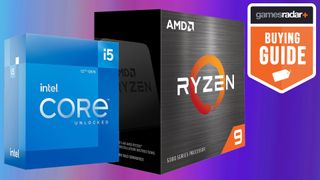
The best CPU for gaming race might open up even further if rumours are anything to go by. Intel has laid out plans for its yearly Innovate conference, and AMD is never to be outdone. Could we see new flagship processors hit the shelves in the next few months? And could they bring with them a new set of motherboard sockets? Until we know more, we've collated a list of our favorite computer brains.
The architecture of modern chips has come a long way, so much so that "mid-range" isn't what it used to be on the Intel or AMD side. But, if you want something that will keep up with the very best gaming PCs, you don't need to look far. The chips on the list below will do you just fine, and shouldn't present any bottlenecks with even the best graphics cards.
For the vast majority of PC gamers, a 12th-generation Intel Core i5 CPU or AMD Ryzen 5000 CPU will do the trick, but you'll need to be doubly sure you've got the right motherboard socket for whatever CPU you go for. For example, AMD CPUs can't be used for Intel motherboards, and the same goes for the other way around. AM4 motherboards will seat a Ryzen 5000 series processor, but you'll need an AM5 for the latest 7000 series. On the Intel side, 12th and 13th Gen CPUs use the same socket, but any further back and you'll need to do your homework on what will fit.
Best CPU for gaming 2024
Why you can trust GamesRadar+





Specifications
Reasons to buy
Reasons to avoid
The Raptor Lake Intel Core i5 processor is an absolute powerhouse that should really make us question what we deem a mid-range CPU to be these days. Packed with 6 performance cores, 6 efficiency cores, and 20 threads, on paper this is essentially a cheaper and more efficient 12th Gen i7.
In gaming, benchmarking, and content creation, this CPU barely broke a sweat, and doing both at the same time barely used up to 15% of the CPU's capacity. That's so efficient that I thought there was something going wrong during testing, because an i5 definitely isn't expected to be this powerful.
If there are any flaws to note here, it might be that there's no turbo max 3.0 here - that's reserved for 13th gen i7 and i9 processors. Like the others in the Raptor Lake bunch, this CPU can be a tad more power hungry than you might like, and it can run hot under stress. Rest assured though, the i5 gives you the best all round package in these regards, and won't be nearly as extreme as an i7 or i9.
When you take price-to-performance into account, there really isn't any beating this CPU without moving to the AMD side. For the absolute majority of players, money shouldn't be wasted. An Intel Core i5-13600K is all you'll need for gaming this generation.
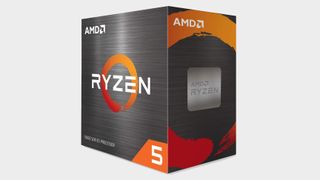
2. AMD Ryzen 5 5600x
Specifications
Reasons to buy
Reasons to avoid
The AMD Ryzen 5600X may not blow anyone away with its sheer power, especially with AMD's 7000 series on the shelves now. But as far as AM4's last-generation chipsets from the company go, it's very hard to beat in terms of price. What's more, the 5600X is frequently on sale, down from its already competitive $260 MSRP.
The AMD Ryzen 5600X is a solid all-around performer with both its single-core and multi-core capabilities in-game, too. That's due in part to this CPU's higher-than-average clock speed combined with its quiet-yet-cool operation over extended periods of time. If you're after a processor to keep your rig ticking over at its best, then the 5600X continues to impress across the board.






Specifications
Reasons to buy
Reasons to avoid
Before there was a Raptor Lake Refreshed Intel Core i7, there was a Raptor lake Intel Core i7. While we're just about to start testing the 14th gen version of this processor, at this point in time, it's hard not to recommend the 13th gen model. It'll likely start to get cheaper now there's a new wave or Intel chips, and the performance it nets you is no short of ridiculous.
The 13700K has 16 cores - only two more than the i5. These are made up of 8 performance cores and 8 efficiency cores. In terms of threads running through these cores, you have 24 - four more than the i5. So the real question remains - do you actually need this extra headroom for the money. For most people, we'd still recommend the 13th Gen i5, but for content creators looking for that extra piece of mind, that extra headroom does make a difference when gaming at higher resolutions and settings.
For a full rundown of how benchmarking scores differ between the two, take a look at the reviews. For now, we'll say that if you're willing to spend that extra $100 or so, you'll get an increase in performance, but just be prepared to work harder when keeping the CPU cool. Similarly, check out the price of the latest AMD Ryzen 7, because the rival version will almost always be found cheaper.
Regardless, this is i9 power in a chip with i7 branding. If you need the extra headroom compared to an i5 or Ryzen 5, you can't go wrong with this.
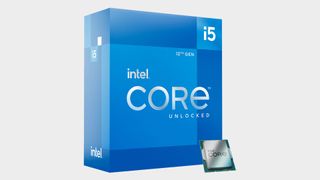
4. Intel Core i5-12600K
Specifications
Reasons to buy
Reasons to avoid
The 12th generation Intel i5 Alder Lake processor does what people were expecting from Rocket Lake - and actually dethrones AMD Ryzen 5000 series for a competitive price-to-performance ratio that's hard to argue against.
Comparing the Intel Core i5-12600K with the less-than-well-received Intel Core i9-11900K, the 12600K actually outperforms it for a fraction of the cost. Indeed, its documented performance means it more than deserves a high spot in our roundup but misses out on that top slot for one simple reason: the 13600K is unreal.
Regardless, one of our editors has this as their CPU of choice, and it's handled gaming and benchmarking with an RTX 4090 with absolute ease. If you like the look and feel of the 13600K but don't wanna splash out as much dough, this isn't too far behind.
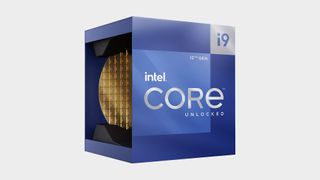
5. Intel Core i9-12900K
Specifications
Reasons to buy
Reasons to avoid
The Intel Core i9-12900K delivers on the chipset's flagship status with some of the fastest single-core performance on the market, even beating that of AMD's Ryzen 9 5950X in many instances (according to our colleagues at Tom's Hardware). For those in the know, that's the last-gen AM4 Ryzen chipset and a CPU that will cost you significantly more than the i9-12900K's still hefty $589.
What that means in practical terms is that the Intel Core i9-12900K is not only one of the best CPUs for gaming but also one of the most affordable i9 processors that's compatible with the current-gen chipset. You'll need a DDR5-compliant motherboard like the Z690 for native PCIe 5.0 and DDR5 support, which could be a double-edged sword. This could mean upgrading your motherboard, but at the same time, you'll be futureproofing yourself for the next while. If you've got the money for upgrading but don't want to splash out on 13th or 14th gen flagships, the 12th gen option might be the one for you.
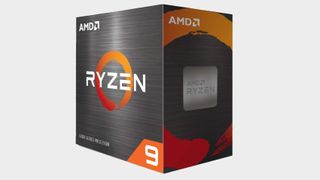
6. AMD Ryzen 9 5900x
Specifications
Reasons to buy
Reasons to avoid
With its staggering 12-core (24 threads) architecture, it's no surprise that this Ryzen processor is an absolute beast for just about any task put in front of it - especially high-end gaming in 4K at exceedingly high frame rates (when paired with a capable graphics card, of course).
With that said, if you're only interested in a processor from a raw gaming perspective, then the 5900x is absolute overkill. Indeed, how this chipset handles everything else - such as video rendering/encoding in high resolutions - tips it over the edge. If you're in the creative field and need a real workhorse that can effortlessly game as well (and you've got the money), there's no doubt that this is the one to get. In terms of speed, it's the best CPU for gaming.
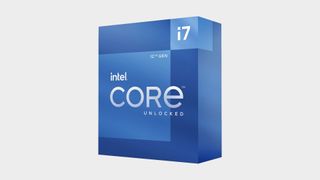
7. Intel Core i7-12700K
Specifications
Reasons to buy
Reasons to avoid
The Intel Core i7-12700K was our testing rig's processor of choice until very recently, and it offers similar performance to the 13th Gen i5 that's at the top of this list. That processor is actually cheaper, but for folks who want that next step up, the 12th Gen i7 offers impressive real-world processing prowess for both general computing tasks and in the latest titles alike.
We've contrasted the current generation of Intel CPUs against themselves, though, how does the $409 Intel Core i7-12700K stack up against the $549 AMD Ryzen 9 5900x? Remarkably well, as it goes. Though the 5900x may have more threads and a higher clock speed, we've seen that the i7-12700K either matches or surpasses it when the chips are down. We're currently testing out the 13th Gen Intel Core i7, so be sure to check back soon to see how that chip compares in terms of value.
Then there's also the consideration of PCIe 5.0 and DDR5 RAM support. The Intel Core i7-12700K will support DDR4 memory, but we advise going all-in with a future-proofed system to keep up with the ever-growing demands of modern games. If you're after an all-rounder of a chipset that's ready for the latest technological leaps in performance, then there's very little you can fault this processor on.
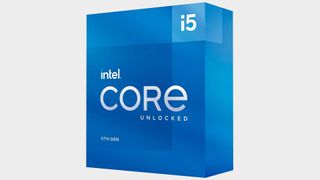
8. Intel Core i5-11600K
Specifications
Reasons to buy
Reasons to avoid
Gaming in Quad HD (1440p) in high refresh rates or 4K60 on PC doesn't need to be crazily expensive, and you can sure save a few bucks by opting for a just-as-capable 11th-gen i5 as opposed to an i7. Or an i9 monster, for that matter. The higher clock speed on the i5-11600K means it can hold its own effectively against Ryzen alternatives and some of the 11th generation i7 on CPUs (on a base level) from a purely gaming perspective as well.
That's to say nothing of the overclocking potential afforded by said-higher clock speed, with the potential of being able to be dialed up all the way to 4.90GHz. If you're after a faster-than-light setup for gaming at a competitive price, there isn't much better from Rocket Lake's revisions for the money.
Best CPU for gaming: FAQs
What CPU do pro gamers use?
While we can't speak for everyone, E-Sports athletes and streamers will likely use the best of the best, highest-end components they can get their hands on to optimise everything about their performance. Particularly streaming will put a lot of strain on hardware if its being done from the same PC that's running a game, so the most powerful CPU and GPU imaginable are necessary if content creators want their footage to look good. Most likely, we'd bet that professional gamers (the type that are draped from head to toe in RGB lighting at all times), will use 13th Gen Intel Core i5 or the most up-to-date Ryzen 9 CPUs.
What is the best CPU type for gaming?
If you're wondering which brand does it better, that's a hard question to answer. We've rounded up the best CPUs for gaming from both Intel and AMD, and depending on your preferences, and maybe the rest of your rig, one or the other might be better suited for you individually. Intel may have the edge on popularity, but AMD has come a long way to combat that in recent years.
For the majority of people, a 12th Gen Intel Core i5, or an AMD Ryzen 5 or 7 will be more than enough for gaming. If you're a streamer, or someone who spends a lot of time doing multimedia production, a higher-end CPU might be advantageous.
What CPU is best for gaming right now?
In our opinion, the best CPU for gaming right now is the 13th Gen Intel Core i5-13600K. On paper, it's a slightly better 12th Gen i7, but it's a lot cheaper. Don't be put off by the fact higher tier processors exist, an i5 like this is an absolute powerhouse, and it'll save you money you can put into other expensive next-gen components.
Do you need a powerful CPU for gaming?
Thanks to modern processor architecture, you may not need as "powerful" a CPU as you think. Ryzen 5 and i5 chips are equivalent to the i9 CPUs from even a few years ago. While you'll still be able to play most games with a CPU that's a few years old, it can benefit you to pair your computer's brain depending on the GPU you use. Even folks with an RTX 4090 don't need an i9 to work with it. The best CPU for gaming for most people doesn't require you to spend that much these days.
What is the strongest CPU?
When it comes to the best CPU for gaming, content creation, or whatever other demanding tasks you might have for it, you're spoiled for choice these days. There's excellent value to be had with the AMD Ryzen 7000 series, especially the ones with X3D in their names, since they've been bred with unreal performance in mind. On paper, the Ryzen 9 in that family takes the cake. But the 13th Gen i9 also packs some outrageous power if you can afford it.
Now you've got one of the best chipsets available for the money, keep your rig in top tier shape with the best gaming keyboard and best gaming monitor on the market, too.
Sign up to the GamesRadar+ Newsletter
Weekly digests, tales from the communities you love, and more

Ever since playing Journey at the age of 15, I’ve been desperate to cover video games for a living. After graduating from Edinburgh Napier University with a degree in Journalism, I contributed to the Scottish Games Network and completed an Editorial Internship over at Expert Reviews. Besides that, I’ve been managing my own YouTube channel and Podcast for the last 7 years. It’s been a long road, but all that experience somehow landed me a dream job covering gaming hardware. I’m a self-confessing PlayStation fanboy, but my experience covering the larger business and developer side of the whole industry has given me a strong knowledge of all platforms. When I’m not testing out every peripheral I can get my hands on, I’m probably either playing tennis or dissecting game design for an upcoming video essay. Now, I better stop myself here before I get talking about my favourite games like HUNT: Showdown, Dishonored, and Towerfall Ascension. Location: UK Remote
- Rob Dwiar
- Aleksha McLoughlinHardware Editor
- Jasmine MannanHardware Editor
Most Popular




